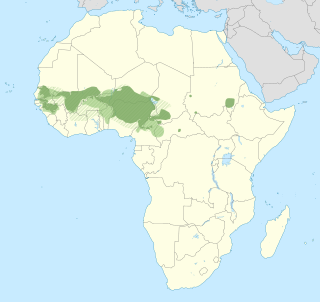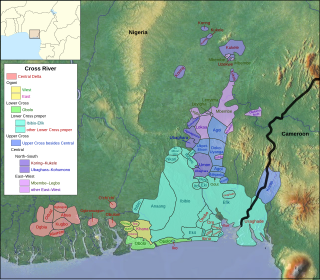Related Research Articles

Korean is the native language for about 80 million people, mostly of Korean descent. It is the official and national language of both North Korea and South Korea, but over the past 74 years of political division, the two Koreas have developed some noticeable vocabulary differences. Beyond Korea, the language is recognised as a minority language in parts of China, namely Jilin Province, and specifically Yanbian Prefecture and Changbai County. It is also spoken by Sakhalin Koreans in parts of Sakhalin, the Russian island just north of Japan, and by the Koryo-saram in parts of Central Asia.

X, or x, is the twenty-fourth and third-to-last letter in the modern English alphabet and the ISO basic Latin alphabet. Its name in English is "ex", plural exes. X is regularly pronounced as "ks".

The Igbo people are an ethnic group in Nigeria. They are primarily found in Abia, Anambra, Ebonyi, Enugu, and Imo States. A sizable Igbo population is also found in Delta and Rivers States. Large ethnic Igbo populations are found in Cameroon, Gabon, and Equatorial Guinea, as well as outside Africa. There has been much speculation about the origins of the Igbo people, which are largely unknown. Geographically, the Igbo homeland is divided into two unequal sections by the Niger River—an eastern and a western section. The Igbo people are one of the largest ethnic groups in Africa.
Particularly within North American English, gay male speech has been the focus of numerous modern stereotypes, as well as sociolinguistic studies. Scientific research has uncovered phonetically significant features produced by many gay men and demonstrated that listeners accurately guess speakers' sexual orientation at rates greater than chance. Historically, gay male speech characteristics have been highly stigmatized and their usage may be sometimes coded to a limited number of settings outside of the workplace or other public spaces.
An honorific is a title that conveys esteem, courtesy, or respect for position or rank when used in addressing or referring to a person. Sometimes, the term "honorific" is used in a more specific sense to refer to an honorary academic title. It is also often conflated with systems of honorific speech in linguistics, which are grammatical or morphological ways of encoding the relative social status of speakers. Honorifics can be used as prefixes or suffixes depending on the appropriate occasion and presentation in accordance with style and customs.

Yuchi (Euchee) is the language of the Tsoyaha, also known as Yuchi people, now living in Oklahoma. Historically, they lived in what is now known as the southeastern United States, including eastern Tennessee, western Carolinas, northern Georgia, and Alabama, during the period of early European colonization. Many speakers of the Yuchi language became allied with the Muscogee Creek when they migrated into their territory in Georgia and Alabama. They were forcibly relocated with them to Indian Territory in the early 19th century.

Fula, also known as Fulani or Fulah, is a Senegambian language spoken by around 30 million people as a set of various dialects in a continuum that stretches across some 18 countries in West and Central Africa. Along with other related languages such as Serer and Wolof, it belongs to the Atlantic geographic group within Niger–Congo, and more specifically to the Senegambian branch. Unlike most Niger-Congo languages, Fula does not have tones.

The culture of Nigeria is shaped by Nigeria's multiple ethnic groups. The country has 527 languages, seven of which are extinct. Nigeria also has over 1150 dialects and ethnic groups. The three largest ethnic groups are the Hausas that are predominantly in the north, the Yorubas who predominate in the southwest, and the Igbos in the southeast. There are many other ethnic groups with sizeable populations across the different parts of the country. The Kanuri people are located in the northeast part of Nigeria, the Tiv people of north central and the Efik-Ibibio are in the south south. The Bini people are most frequent in the region between Yorubaland and Igboland.
A language barrier is a figurative phrase used primarily to refer to linguistic barriers to communication, i.e. the difficulties in communication experienced by people or groups originally speaking different languages, or even dialects in some cases.
Variation is a characteristic of language: there is more than one way of saying the same thing. Speakers may vary pronunciation (accent), word choice (lexicon), or morphology and syntax. But while the diversity of variation is great, there seem to be boundaries on variation – speakers do not generally make drastic alterations in sentence word order or use novel sounds that are completely foreign to the language being spoken. Linguistic variation does not equate with language ungrammaticality, but speakers are still sensitive to what is and is not possible in their native lect.
Research into the many possible relationships, intersections and tensions between language and gender is diverse. It crosses disciplinary boundaries, and, as a bare minimum, could be said to encompass work notionally housed within applied linguistics, linguistic anthropology, conversation analysis, cultural studies, feminist media studies, feminist psychology, gender studies, interactional sociolinguistics, linguistics, mediated stylistics, sociolinguistics, and feminist language reform and media studies.
In phonetics, ingressive sounds are sounds by which the airstream flows inward through the mouth or nose. The three types of ingressive sounds are lingual ingressive or velaric ingressive, glottalic ingressive, and pulmonic ingressive.

The Cross River or Delta–Cross languages are a branch of the Benue–Congo language family spoken in south-easternmost Nigeria, with some speakers in south-westernmost Cameroon. The branch was first formulated by Joseph Greenberg; it is one of the few of his branches of Niger–Congo that has withstood the test of time.
LGBT linguistics is the study of language as used by members of LGBT communities. Related or synonymous terms include lavender linguistics, advanced by William Leap in the 1990s, which "encompass[es] a wide range of everyday language practices" in LGBT communities, and queer linguistics, which refers to the linguistic analysis concerning the effect of heteronormativity on expressing sexual identity through language. The former term derives from the longtime association of the color lavender with LGBT communities. "Language", in this context, may refer to any aspect of spoken or written linguistic practices, including speech patterns and pronunciation, use of certain vocabulary, and, in a few cases, an elaborate alternative lexicon such as Polari.

Feminist language reform has proposed gender neutrality in languages with grammatical gender, such as Spanish. Grammatical gender in Spanish refers to how Spanish nouns are categorized as either masculine or feminine. As in other Romance languages—such as Portuguese, to which Spanish is very similar—a group of both men and women, or someone of unknown gender, is usually referred to by the masculine form of a nouns and or pronoun. Advocates of gender-neutral language modification consider this to be sexist, and exclusive of gender non-conforming people. They also stress the underlying sexism of words whose feminine form has a different, often less prestigious meaning. Some argue that a gender neutral Spanish can reduce gender stereotyping, deconstructing sexist gender roles and discrimination in the workplace.
Many languages have distinct sets of enunciation and/or of writing, dependent on whether the speaker or writer be a man or a woman, and/or on whether the party or parties addressed be men or women.

The Bendi languages are a small group of languages spoken in Cross River State, southeastern Nigeria. Bokyi is one of the Bendi languages having some speakers in Cameroon. Once counted among the Cross River languages, they may be a branch of Southern Bantoid, with observed similarities especially with the Ekoid languages.
Nigerian English, also known as Nigerian Standard English, is a dialect of English spoken in Nigeria. Based on British English, the dialect contains various loanwords and collocations from the native languages of Nigeria, due to the need to express concepts specific to the culture of the nation.
The Japanese language has some words and some grammatical constructions associated with men or boys, while others are associated with women or girls. Such differences are sometimes called "gendered language". In Japanese, speech patterns associated with women are referred to as onna kotoba or joseigo, and those associated with men are referred to as danseigo.
Yoruba Sign Language (YSL) is an indigenous sign language of the Deaf community in Yoruba-speaking communities of southwestern Nigeria.
References
- ↑ Ubang at Ethnologue (18th ed., 2015) (subscription required)
- ↑ "Bendi languages". www.rogerblench.info. Retrieved 2017-07-31.
- 1 2 3 Yemisi, Adegoke (23 August 2018). "Ubang: The Nigerian village where men and women speak different languages". BBC. Retrieved 7 June 2019.